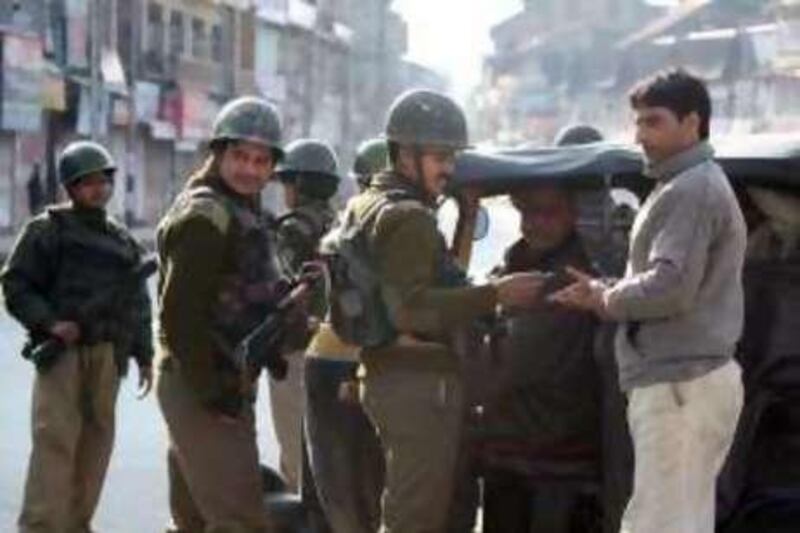SRINAGAR, INDIA // In the run up to the closing phase of staggered elections for the provincial assembly, Srinagar, the summer capital of restive Indian-administered Kashmir, has been fashioned into a security camp. Thousands of police and paramilitaries armed with assault rifles and big bamboo sticks were out on the streets yesterday to enforce an undeclared curfew. Few people were allowed to walk or drive through the town's empty roads, which were under a watchful line of paramilitary police who laid barbed wire and positioned "bunker vehicles" across passageways. "It is a necessity, a preventive arrangement. We're duty-bound to protect the life and property of the people," said the region's police chief, Afhad al Mujtaba. On Monday, suspected militants shot dead two policemen patrolling a street in the north-western town of Sopore and targeted a polling station in Batamallo, a Srinagar suburb, with hand grenades. Earlier, scores of activists of pro-Indian political parties and policemen protecting them were injured in a string of mob attacks, mainly in the old part of Srinagar. The state director general of police, Kuldeep Khuda, said three suspected Islamic militants, including a Pakistani soldier, had been arrested. He said the suspects are members of Jaish-i-Muhammad, one of more than a dozen groups that have been fighting the Indian rule over Kashmir, and were planning a suicide attack in the area. He added that police did not yet know the intended target of the attack but claimed the three men "had received specialised training in suicide attacks and driving explosives-laden vehicles". The official identified one of the men as Ghulam Farid and claimed that he was a Pakistani soldier serving in the Azad Kashmir, or Free Kashmir, regiment and has provided his army service number. There was no immediate response from the Pakistani army. According to Mr Khuda, the trio was detained on Sunday after checking into a hotel in Jammu. He added that the men apparently had illegally entered India from Bangladesh and were detained after police received a tip about their location. Kashmiri separatists seeking an end to New Delhi's rule over the disputed Himalayan region have called for boycott of the elections, saying any such exercise held under the framework of the Indian constitution cannot be a substitute to the promised plebiscite. Elections, they argue, also strengthen India's hold over the disputed region. They have urged people to gather in Srinagar today for a pro-freedom rally. Most separatist leaders and activists have either been detained or placed under house arrest in the police clampdown against anti-election forces. "It is an illegitimate exercise. They can't impose curfew and then hold elections under the barrel of gun. It is a joke being played on the people here," said Mirwaiz Umar Farooq, the chief Muslim cleric and leader of separatist Hurriyat (Freedom) Conference. In a phone interview, the 34-year-old cleric and politician said: "Even international law says elections can't be held under any coercion, intimidation or restrictions. India is a signatory to the UN Human Rights Charter which says an election is genuine and can be acceptable only if held free and fair." Voting is also being held in the Hindu-majority winter capital, Jammu, and Samba district, marking an end to a seven-phase election that began on Nov 17. The first six rounds of voting saw a more than 60-per-cent turnout, which New Delhi says reflects Kashmiris' faith in Indian democracy and vindicates its official position vis-à-vis the issue of Kashmir. Kashmiri separatists, downhearted over being spurned by a vast majority of voters elsewhere, are desperate to seize the final phase of the elections. The authorities are concerned about averting more violence. The election period has, so far, claimed three lives and seen only scattered protests and clashes. Srinagar has been the hotbed of the pro-independence campaign, which is why the authorities placed Srinagar under an informal curfew. "We're not worried over the thought that many Srinagar residents may obey the separatists' poll boycott. Srinagar only has eight seats to fill in the 87-member house. But what makes us anxious is how to uphold peace and prevent planned protests from swelling or turning violent," said a senior government official, who spoke on condition of anonymity. Meanwhile, India's army chief, Gen Deepak Kapoor, has visited Siachen Glacier, the world's highest and coldest battlefield, and some other areas on Kashmir's frontier to check the operational preparedness of the troops. The unscheduled visit came one day after Pranab Mukherjee, India's foreign minister, told a conference of more than 100 Indian ambassadors and high commissioners in New Delhi that his country was "not closing any option" of dealing with Pakistan. Army sources in Srinagar said that Gen Kapoor interacted with the unit commanders and senior officers but refused to divulge any details. Though the authorities have denied newspaper reports about military build-up taking place along India's borders with Pakistan in Kashmir or the leave of armed forces being cancelled, they do admit that in the aftermath of the November terror strikes in Mumbai, army units both along the 767km Line of Control and 189km International border with Pakistan in the Himalayan region have been maintaining a close vigil. Also, some of India's air force fighter squadrons in bases in forward areas have been on a "cockpit alert" under which the force remains ready for military operations. However, in New Delhi, the prime minister, Manmohan Singh, said India did not want war but urged Pakistan to dismantle what he said was its "terror machine". yjameel@thenational.ae
Kashmiris vote under security clampdown
As the region nears the final phase of polling, Indian authorities impose a surprise curfew and other measures in response recent violence.

Editor's picks
More from the national




